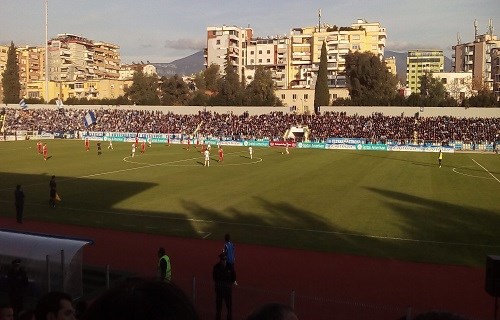Match-fixing on an unprecedented scale
Six-times Albanian champions, Skenderbeu, are currently facing accusations concerning extensive manipulation of results to obtain significant betting profits. A recently leaked UEFA (Union of European Football Associations) report, has recommended Skenderbeu, who competed in the Europa League this season, to be banned from competitions for 10 years, reports British the Guardian, who has seen the report.
The report, written by two of UEFA’s ethics and disciplinary inspectors, has not been made public, however, according to the Guardian, the report concludes that Skenderbeu “has been fixing football matches like nobody has ever done before in the history of the game”.
Group stage games, at home against Lokomotiv Moscow and away against Sporting Lisbon are of particular concern. Skenderbeu lost 0-3 and 5-1 respectively, both matches’ outcomes following intensifying betting patterns.
“The former [match] saw a flurry of ‘exuberant and illogical’ bets made for six or more goals to be scored with Sporting 4-0 up late on; the latter, according to the report, became subject to a rush of highly suspicious, and accurate, bets when Skenderbeu were a goal down with five minutes left. There is no suggestion of wrongdoing from Skenderbeu’s opponents,” writes the Guardian.
Years of manipulation
The current investigation forms the second of two stages and is part of more severe disciplinary sanctions against the club. In 2016, Skenderbeu was suspended from competitions for match-fixing following a discovery made by UEFA’s betting fraud detection system (BFDS). The BFDS identified more than 50 matches, between November 2010 and April 2016, allegedly manipulated for betting purposes.
The Guardian journalist, Nick Ames, describes an infamous case of irregular play:
“The best-known of the ties is a Champions League second qualifying round, second leg against the Northern Irish side Crusaders on 21 July 2015. Skenderbeu had won the home fixture 4-1 and went 2-1 up in the return. There followed what the report terms ‘some outrageous suspicious live betting’ totalling ‘a minimum of several hundreds of thousands of dollars’; Skenderbeu ran scant risk of losing the tie at this stage and conceded twice in the last 10 minutes, with Crusaders also having two goals disallowed.”
Following the game, Crusaders goalkeeper, Sean O´Neill wrote in a tweet: “If there is not a UEFA investigation into our game tonight, then there is something wrong.”
Players, presidents and a former minister under scrutiny
Current Skenderbeu president, Ardjan Takaj, who succeeded Agim Zeqo in 2012, and former Albanian finance minister, Ridvan Bode are both believed to have been involved in the alleged match-fixing.
According to the UEFA report, Ridvan Bode has been a key figure holding “the power, the connections and the knowledge to influence Skenderbeu’s matches and […] has done so over the years”.
Yet, in a statement to the Guardian, Bode denied the allegations about his involvement saying that the allegations were made with “reckless ease” and asserted that he was “never a part of and have never been aware of any attempt to influence any match’s result”.
Ardjan Takaj allegedly used relationships with the team’s players to manipulate their performance on the pitch. A section of the report focuses on Takaj’s business dealings and links between betting firms and Skenderbeu.
“I have never been involved, directly or indirectly, in any activities aiming to manipulate the outcome of the match, neither [have] persons related to me,” Takaj explained in an interview with the Guardian.
In addition, the report suggests that goalkeeper, Orges Shehi and defender Tefik Osmani are among those who have profited from match-fixing.
Death threats against investigators
The UEFA investigation, and the prospect of sanctions being imposed on Skenderneu, has caused a ripple causing anonymous perpetrators to issue death threats against UEFA Disciplinary Inspectors.
“Today, UEFA Disciplinary Inspectors working on this case have received anonymous death threats, presumably intended to intimidate them and stop them carrying out their work. These threats will not succeed and the police have also been informed,” writes UEFA in a statement.
“UEFA remains fully committed to the fight against match-fixing and all UEFA staff working on these crucial matters can count on the full support of the organisation,” the statement adds.
UEFA President, Aleksander Čeferin, asserts that the organisation will “never allow UEFA staff working on these matters, or any other matters, to be subject to threats or intimidation from any third parties” and stresses that the affected members of the staff have UEFA’s full backing and support.






